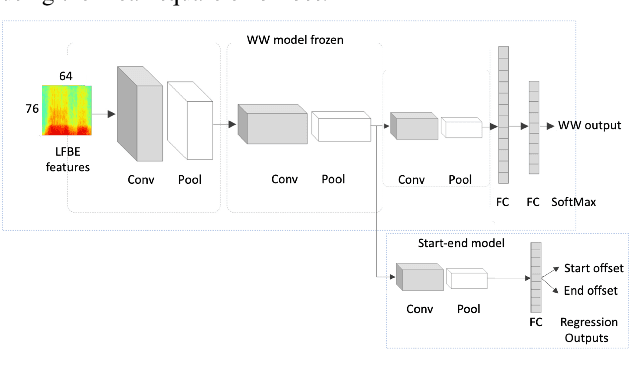Thibaud Senechal
AB/BA analysis: A framework for estimating keyword spotting recall improvement while maintaining audio privacy
Apr 18, 2022



Abstract:Evaluation of keyword spotting (KWS) systems that detect keywords in speech is a challenging task under realistic privacy constraints. The KWS is designed to only collect data when the keyword is present, limiting the availability of hard samples that may contain false negatives, and preventing direct estimation of model recall from production data. Alternatively, complementary data collected from other sources may not be fully representative of the real application. In this work, we propose an evaluation technique which we call AB/BA analysis. Our framework evaluates a candidate KWS model B against a baseline model A, using cross-dataset offline decoding for relative recall estimation, without requiring negative examples. Moreover, we propose a formulation with assumptions that allow estimation of relative false positive rate between models with low variance even when the number of false positives is small. Finally, we propose to leverage machine-generated soft labels, in a technique we call Semi-Supervised AB/BA analysis, that improves the analysis time, privacy, and cost. Experiments with both simulation and real data show that AB/BA analysis is successful at measuring recall improvement in conjunction with the trade-off in relative false positive rate.
Accurate Detection of Wake Word Start and End Using a CNN
Aug 09, 2020



Abstract:Small footprint embedded devices require keyword spotters (KWS) with small model size and detection latency for enabling voice assistants. Such a keyword is often referred to as \textit{wake word} as it is used to wake up voice assistant enabled devices. Together with wake word detection, accurate estimation of wake word endpoints (start and end) is an important task of KWS. In this paper, we propose two new methods for detecting the endpoints of wake words in neural KWS that use single-stage word-level neural networks. Our results show that the new techniques give superior accuracy for detecting wake words' endpoints of up to 50 msec standard error versus human annotations, on par with the conventional Acoustic Model plus HMM forced alignment. To our knowledge, this is the first study of wake word endpoints detection methods for single-stage neural KWS.
 Add to Chrome
Add to Chrome Add to Firefox
Add to Firefox Add to Edge
Add to Edge